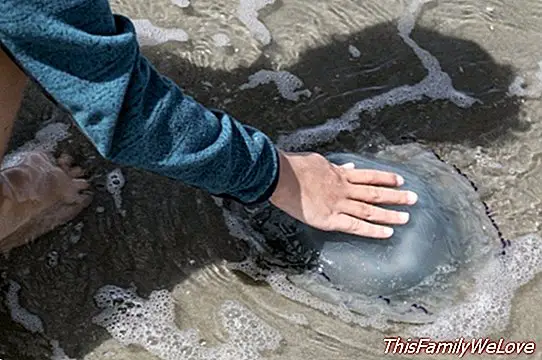Jellyfish stings: when to go to the emergency room

The influx of jellyfish to our coasts has suffered an increase in recent years due to winds and marine currents. In the Mediterranean, the Levante storms bring them closer to the shore and any swimmer is exposed to suffer one of their painful bites. But what to do when the jellyfish sting affects our children and when to go to the emergency room?
The most frequent symptoms in the jellyfish sting They are pain, itching in the area, inflammation, redness, even bleeding. All these symptoms are produced by the stinging cells of the jellyfish that contain a poison inside.
What to do when a jellyfish stings you
Dr. Eduardo Bermell, of the Pediatric Emergency Service of Vithas Nisa Rey Don Jaime Hospital, assures that "when a jellyfish stings you, pain and intense itching immediately appear, so the first thing to do is clean the affected area by the bite. The ideal to clean the area is the physiological serum. If there is not, the saltwater it may also be an alternative solution. "
However, points out that "we must disprove some popular myths such as urine, fresh water on the wound or cover it with sand as this would only contribute to spread the toxic inoculated by the jellyfish, and could even aggravate the skin rash."
Following with the recommendations, "in the case that some tentacle of the jellyfish has remained attached to the skin, It is necessary to remove it, but always using gloves to avoid contact or use a few simple tweezers. Pour a little vinegar can help detach it from the skin more easily, "says Dr. Bermell.
Once the area is clean, to reduce the sting of the bite, cold should be applied to the affected area for approximately 15 minutes. According to Dr. Bermell "you should not apply ice directly on the bite, but covered with a cloth or towel."
When to go to the Emergency Room after a jellyfish sting
After these initial guidelines, in general, the post-bite clinic usually yields in a few hours, although in the following days you should go to the doctor if there is anguish, agitation, loss of appetite, conjunctivitis and sometimes headache.
"Usually," says Dr. Bermell, "jellyfish bites are not usually serious, although there are always exceptions when we talk about allergic people to these marine organisms or that have some type of disease that makes vary the typical symptoms of this bite. In this case of allergy, the visit to the Emergency Department is important ".
Exceptionally, you must go to the Emergency Department, both with children and adults, when there is a anaphylactic shock, that is, a severe allergic reaction to the poison of the jellyfish, "because the distribution of the poison throughout the body," he says, "can lead to a sense of chest tightness, muscle cramps and even respiratory distress and more rarely the symptomatology can be more serious, and present with an alteration of the central nervous system, convulsing. "
What to do if the jellyfish has bitten your children?
"If the jellyfish has bitten any of your children, you have to find a lifeguard, a health center or a post of the Red Cross where they can serve you, since the poison can affect children more intensely simply because their weight is lower than that of adults, and at the same time it is convenient to observe that their respiratory rate does not change, neither cardiac, "explains Dr. Mirna Olivo , of the Pediatric Emergency Service of Vithas Nisa Rey Don Jaime Hospital.
Mónica Ramírez Triquell
Advice:Dr. Eduardo Bermell, of the Pediatric Emergency Service of the Hospital Vithas Nisa Rey Don Jaime




